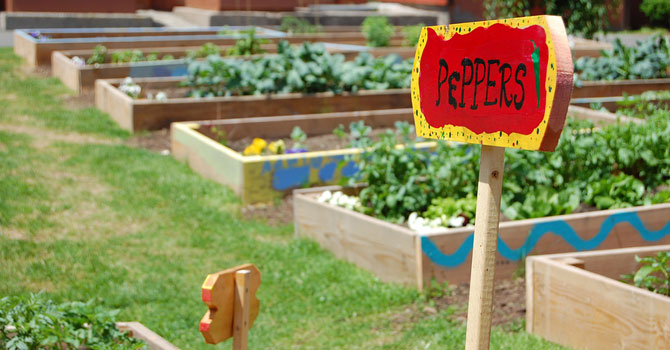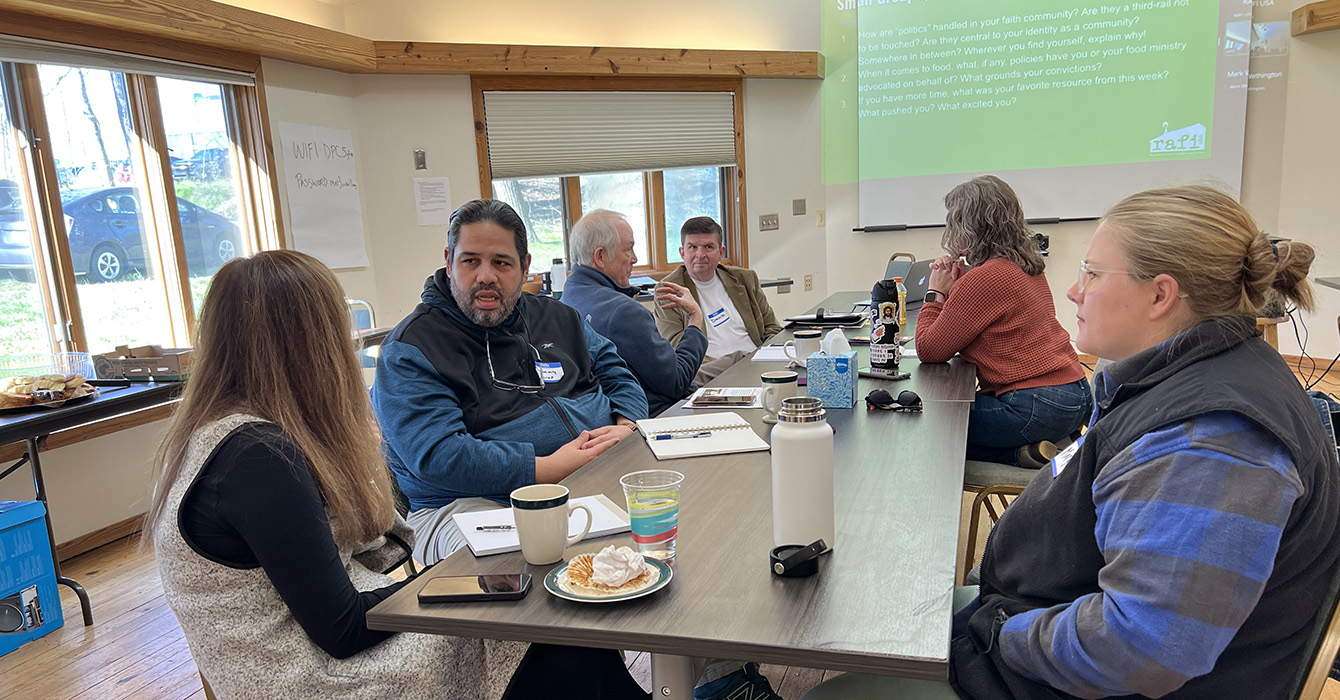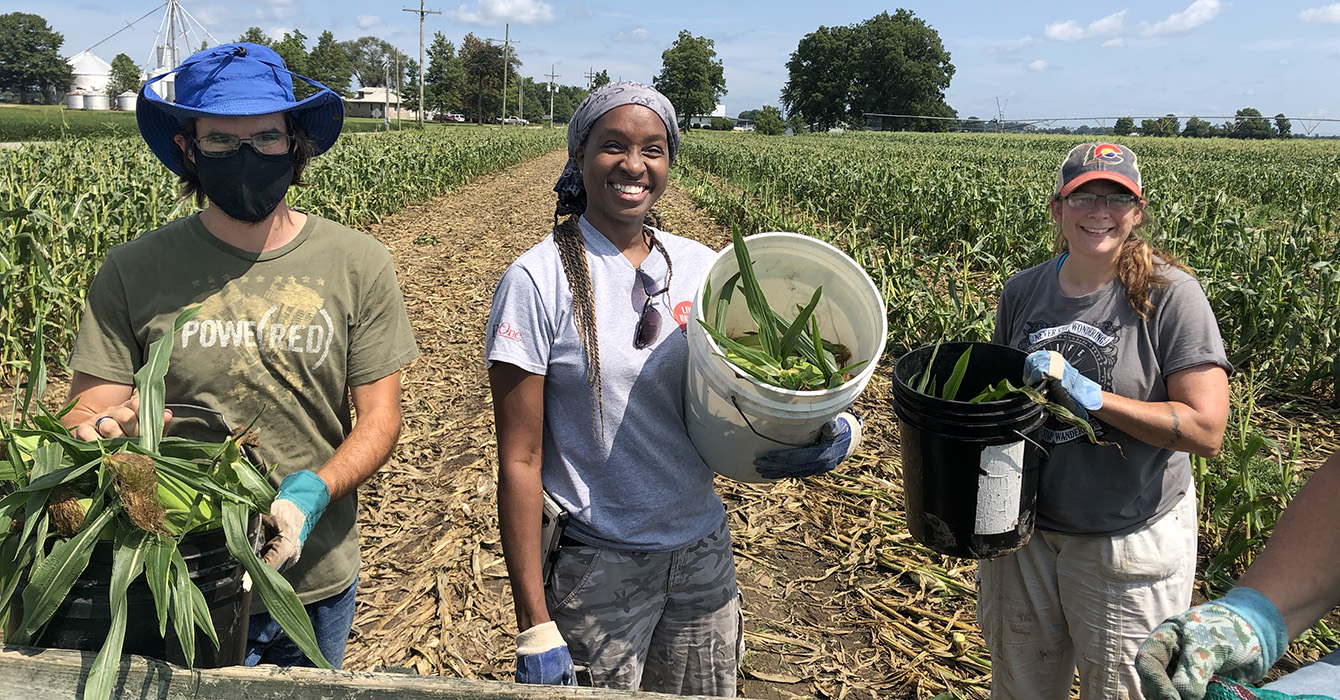In 2014, the Rev. Nurya Love Parish, an Episcopal priest who was already active in farm and food ministry, read that the Jewish food movement was far better known than the Christian food movement, as evidenced by internet search results for those terms. It brought home to her that nobody really had a handle on the growing number of programs and people working at the intersection of church and food.

“I don’t know why, but somehow I just took that as a personal challenge,” she said. “I knew there was a Christian food movement; we just weren’t calling it that. I knew I was really hungry for more examples of how this works. So I thought, maybe if I put what I know about it into one place, it would help people and it would help me to learn what I am doing with this call that God has for me.”
As a result, Parish set out to document the growing Christian food movement and, in 2015, published the Christian Food Movement Guide -- a compilation of books, churches, organizations and other resources in the field. The guide is now available as a user-friendly online directory or a downloadable PDF at the Christian Food Movement website. The directory is a helpful aid for those who want to delve more deeply into this nascent movement and further explore the intersection of food and faith.
Parish is the co-founder and executive director of Plainsong Farm, a new ministry that incorporates community-supported agriculture, charitable food, worship and discipleship. She is also the priest-in-charge at Holy Spirit Episcopal Church in Belmont, Michigan.
Parish spoke with food writer and scholar Adrian Miller recently for Faith & Leadership about the growing Christian food movement. The following is an edited transcript.
Q: How would you describe the Christian food movement to someone who’s unfamiliar with it?
The umbrella of the Christian food movement -- and it’s a big umbrella -- springs from a recognition that our current food system reflects the fall of humanity more than it reflects God’s intent for God’s good creation that we belong to.
The whole Christian food movement springs from a desire to be faithful to the gospel of Jesus Christ in a way that integrates our daily bread with our desire to proclaim Christ. And then it seems to stream out in currents that are about health and about justice and about sustainability.
How do we increase access to fruits and vegetables and healthy foods through our food ministry? How do we get past food charity into food justice and food sovereignty? How do we eat in a way that supports a living wage for farm workers and food chain workers?
Health then goes into justice -- and a lot of church gardens are part of, and spring out of, these concerns. There are so many church gardens, if you add them all up. They are a powerful witness to the gospel, but often, they’re seen as an optional adjunct to the real ministry that happens in the sanctuary.
But real ministry happens in the garden just as much as a sanctuary. God didn’t put Adam and Eve into a sanctuary. God put Adam and Eve into a garden.
And then after health and justice issues, there’s sustainability, which is about soil stewardship, recognizing that we are meant to be one with the dust of the ground and inspired with the breath of God -- that’s right in Genesis. And so how does that make a difference in how we tend the land?
There’s a whole movement of farmers, both large-scale and small-scale, including our farm, who are trying to align our growing practices with our faith as disciples of Christ and stewards of creation.
Q: What got you interested in the Christian food movement? Was it a desire to start a farm ministry, or was it something else?
No, it was definitely this call. I was living at the farm at that time, and I’m clergy. Clergy is my whole job.
I really did not have an understanding of what God was calling me to do, because my understanding of what clergy was is you serve an existing church: you pastor that church; you teach that church; you provide the sacraments to that church.
When I first started talking about farm ministry to fellow clergy, they looked at me like I was probably insane -- which only reinforced my own deep concerns about that potential myself. But that’s what got me really interested in trying to find anybody else that could help me understand what God was doing in my life.
I read Fred Bahnson’s book “Soil and Sacrament,” and through that I discovered Hazon, which is a Jewish organization that works at the intersection of the Jewish faith and sustainability in the Jewish world and beyond.
I started following Nigel Savage, who is the founder of Hazon, and paying attention to what he did in the world. I read a speech that he gave at the Jewish Theological Seminary in which he noted that the Jewish food movement generated significantly more Google search results than the Christian food movement did.
I don’t know why, but somehow I just took that as a personal challenge. I knew there was a Christian food movement; we just weren’t calling it that. I knew I was really hungry for more examples of how this works. So I thought, maybe if I put what I know about it into one place, it would help people and it would help me to learn what I am doing with this call that God has for me.
Q: What are the current frontiers of the movement?
The biggest frontier that I see is that there’s not enough conversation happening between the different sectors that are engaging in this work. So there’s a group that’s focused on health and access to healthy food as an outgrowth of discipleship, and there’s this group that’s focused on soil stewardship and sustainable agriculture, and then there are denominational and church leaders who are just starting to ask, “What is Christian discipleship integrated with food and agriculture?”
So to me, the frontier is bringing these different sectors and different places in dialogue with one another. It’s all very locally oriented as well, which it should be. But I think it’s through dialogue that we can discern what God is doing in our midst and support one another in our life as disciples.
And there isn’t an infrastructure yet that is cultivating that type of dialogue. That’s why I started the [Christian Food Movement] website, to try to bring people together virtually, because I didn’t have the capacity to bring people together in the flesh.
Another frontier that is really significant is that the mainline church is going to have property without congregations unless things change significantly. So when churches close, what happens to their property? Is there a way the property could be made available to new ministries that integrate sustainable agriculture and Christian discipleship and work for justice and health for all?
Another frontier is, how do we help the church to return to its roots in the garden and the meal? Because Christianity has suffered from a disembodiment that is not organic to the gospel. The visions that God provided for God’s people are incarnational, but a lot of our churches don’t reflect those visions. They are not looking back to the Bible; they’re looking back to the 1950s. And so we need curricula and programs that wake the church up to God’s intent for humanity and how that connects to their daily lives and daily bread.
The last frontier that I would note is the potential for reconciliation through food and land. Everybody eats, and everybody understands that there’s a concern for daily bread. That creates opportunities around food and agriculture, which open doors that are sometimes hard to open.
Can Muslim and Jewish and Christian leaders come to the same table for dialogue about what their traditions teach regarding food ethics and land stewardship? Could majority-white churches make land available for the Black Church Food Security Network to grow on, to enable access to healthy food for African-American communities that don’t have it in urban areas -- primarily Baltimore, which is where the Black Church Food Security Network began?
These are difficult conversations to begin, but they’re also critical conversations, because we all share one earth. We all need wisdom for how to live on it well, and we all eat every day.
Q: What about the churches that have community gardens? What still needs to be done?
The church needs to become articulate about how our gardens are a witness to Christian discipleship; they are not just optional food justice outreach ministries.
We need scriptural reflection and prayer to be happening in our gardens. We need to see our gardens as places to worship the Creator who made us from the dust of the ground and causes all those plants to come forth from the earth. We need to see our gardens as places to teach our children not just about how to grow food but what it means to be Christian.
Jesus uses so many agricultural metaphors. Our gardens are places that we should be exploring how those metaphors resonate in our lives. And we need to be publicly articulate about a Christianity that understands that discipleship means stewardship of creation.
And the opportunity that exists also is to invite people who are seekers spiritually to meet us in our gardens, because everybody can relate to a garden. Christianity that’s articulate about the role of disciples as stewards of creation is evangelism done outside, and we need to make clear that our gardens exist to proclaim the good news of God in Christ.
Q: Other than articulating a vision and raising awareness of what is being done in this field, is there anything else you think that’s being neglected right now?
I would say that denominational leaders in the mainline churches -- particularly the folks who are allocating funding for research and funding for new ministry -- have not yet recognized the potential impact for new ministry at the intersection of food, agriculture and discipleship.
And one thing that is seriously missing is jobs for young people in their 20s who want to work at the intersection of Christian discipleship and sustainable agriculture for food justice. They are seeking out these opportunities, and there are not enough. So they end up working in the institutional church as we know it, trying to figure out whether the church will support a garden ministry, or they end up in secular food justice work, because that’s who values their capacity to grow food and share it.
Q: Where do you hope and pray the Christian food movement will be in five years?
I hope I’ll be frustrated about different things. I hope multiple leaders will have caught on to the potential that the movement has to renew the church through a return to our roots in the garden and at the table.
In five years, I hope that people understand what a farm ministry is and that it is an authentic expression of Christian discipleship. In five years, I want to see Christian education happening in gardens, not in basements, except during the winter.
I want to see the growth of the Black Church Food Security Network. I want to see the growth of Honoré Farm and Mill’s program where congregations grow heirloom wheat and learn about sustainability and climate change and health and nutrition as it connects to their communion practices.
I am still working all of this out in my own life, and I do not eat perfectly, and I am a sinner in need of grace. I am not a paragon of virtue.
There’s always a danger, when you interview somebody as, like, “the expert,” of thinking they have everything organized and their act together, and I just believe that this is part of my walk with Christ and my growth as a disciple.
So my hope is to continue to grow as a disciple and grow into living my values as clearly as I attempt to articulate them. But I’m not there yet.
Q: What do you think about the hospitality aspect of the Christian food movement?
It’s actually at the core of our faith. We are part of God’s world, and God has set a table for us in the midst of that world.
We are called to set tables for one another that are tables of grace and reconciliation, welcoming the stranger and recognizing that we can see God in that other person’s face. Just discovering how we can do that is part of our life as disciples.
Q: What was the last memorable meal that you had?
The last memorable meal that I had was when I was in North Carolina visiting Grace Hackney, who’s the founder of Life Around the Table. The thing that was beautiful about it was both the food, which was local, accessible and very seasonal, and also the company of people. We all were seeking to live out God’s path through helping the church understand and helping the church renew itself through attention to our eating practices.
And it just was a time of grace.












